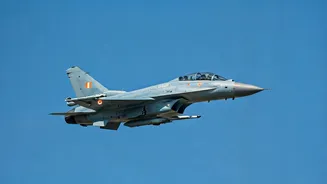Military Exercises & Strategy
India's military is consistently involved in exercises aimed at enhancing its defense capabilities. The 'Trishul 2025' exercise, as reported, led to significant
reactions from Pakistan, reflecting the strategic importance of these drills. Simultaneously, the Indian Air Force is preparing to acquire more Meteor air-to-air missiles, a move intended to enhance its beyond visual range (BVR) capabilities. These acquisitions and exercises show India's commitment to modernizing its military to face potential threats. The exercises are not merely for show; they are vital for preparing the armed forces for a range of contingencies, ensuring readiness to protect the nation's interests. The focus is always on refining tactics, improving coordination among different branches of the armed forces, and integrating cutting-edge technologies into operational strategies. Such consistent training prepares the armed forces for future challenges, bolstering India's overall defense posture. Furthermore, the strategic implications of these exercises reach beyond the immediate region, influencing the geopolitical dynamics.
International Partnerships
The strengthening of international ties plays a crucial role in India's defense strategy. The signing of a significant 10-year defense pact with the United States indicates a deepening of strategic cooperation. This agreement is particularly noteworthy for the scope and duration of the commitments involved. Through these partnerships, India gains access to advanced technologies, training, and operational insights, which are invaluable for its military modernization efforts. These alliances also contribute to broader geopolitical stability, offering mutual support and deterrence against potential aggressors. The strategic alignment with global powers provides India with increased influence and bargaining power. Such collaborations encompass various aspects of defense, including joint research and development, equipment procurement, and regular military exercises. These collaborations serve to enhance the overall effectiveness and readiness of the Indian armed forces and contribute significantly to global security.
Domestic Security Concerns
India continues to face internal security challenges, as evidenced by incidents such as the arrest of operatives of the banned Sikhs for Justice. Their alleged involvement in pro-Khalistan graffiti on school walls in Punjab underscores ongoing threats to social harmony and stability. The BSF also apprehended a Pakistani intruder along the international border in Punjab, highlighting the persistent challenges related to border security. The government's actions include measures such as increased surveillance, law enforcement operations, and efforts to counter extremist ideologies. Maintaining robust security measures is crucial to safeguarding the country's territorial integrity and protecting its citizens from internal and external threats. Strengthening the legal and intelligence frameworks is equally important to proactively addressing security challenges and maintaining peace.
Technological Advancements
India's armed forces are undergoing significant technological transformations to enhance their operational capabilities and readiness. The Indian Army is strategically focusing on becoming AI-ready, a shift which reflects a proactive approach to leveraging cutting-edge technology for future combat scenarios. The acquisition of advanced missiles and the integration of artificial intelligence into military operations reflect India's commitment to staying at the forefront of defense technology. These technological advancements enhance the military's ability to respond effectively to threats. This digital transformation is not only crucial for enhancing combat effectiveness but also for ensuring better resource management and improved decision-making capabilities. Embracing technological advancements is seen as essential for maintaining a strong and modern military that can meet the challenges of the 21st century.
Historical Preservation
Preserving military history is another critical aspect of national identity and strategic understanding. The INS Gomati, after a storied career, is set to become a centerpiece of the Naval Shaurya Museum in Lucknow. Such initiatives serve to educate the public about the nation's defense heritage and inspire future generations. The integration of historical artifacts into museums and educational programs helps in preserving military history and fostering a sense of national pride. These museums act as educational centers, allowing visitors to learn about the sacrifices and achievements of the armed forces. They also play a critical role in promoting a strong national identity and ensuring that the legacies of past heroes and pivotal events are remembered.























